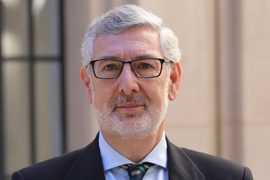
“The best response to the violence is not hatred, but the daily courage of those who continue to believe that ideas are fought with other ideas. Never with violence.”
CEFAS was formally established last July [2021], when its constitution was approved by the Board of Trustees of the San Pablo CEU University Foundation—although, of course, it had been in development for more than a year.
Up until now, its main activity had consisted of leadership courses for young professionals structured into two clearly differentiated thematic blocks. One revolves around the question ‘what do I need to know’ in order to act in public life, while the other asks ‘how can I act’ in the same field. During the next academic year, we also plan to launch a new course for university students, which will run alongside the four years of the current full degree offerings.
In addition to these training projects—which make up our ‘Leadership School’—we have also engaged in intense international networking, especially in Europe, with like-minded individuals and institutions.
The main objective of this conference is to facilitate an awareness that could be summarised in the following phrase from Isaiah: If you do not stand firm in your faith, you shall not stand at all. Unbelief—atheism—is a disease that, if not cured in time, inevitably leads to death. And pseudo-religions like the ‘woke’ ideology can only accelerate this process of decomposition and death. It is necessary to believe—not just in any old thing but in that which, from the beginning, has given life and vigour to our continent. In short, if Europe wants to remain in history, if it wants to continue to exist, it needs to overcome its rationalist moment and return to the sources of its religiosity.

More information (in Spanish) about the conference here.
It is addressed to a relatively broad audience of people who are concerned about the future of Europe—and who wonder what can be done to reverse this process of decline.
I see Christianity as the ‘Father’s house,’ as in the parable of the Prodigal Son. And I hope and trust that, after the adventure of attempting to build a world without God, and after squandering our entire moral and material heritage, we will be capable of doing an exercise of memory. I pray we can remember who we are and where we come from—and, with full humility, get up and direct our steps towards the place from which life comes to us.
There are certainly many prominent figures coming, starting with thinkers committed to the res publica—such as French philosophers Chantal Delsol and François-Xavier Bellamy, or the American writers Rod Dreher and Rusty Reno, not to mention representatives of the always rich, Italian Catholic culture, such as Francesco Giubilei and Giulio Meotti.
We will have, of course, a large Spanish contingent, of which I would like to highlight the outstanding figure of Dalmacio Negro Pavón, as well as thinkers and academics from other parts of Europe, and specifically from Russia and Central Europe, including Balázs Orbán, who will inaugurate our congress. All of them have something to say, have thought long and hard about this subject, and are clearly aware that “a disease is spreading across Europe and the West”—and that it is none other than the agony of Christianity.
Naturally, these are inseparable realities. To such an extent that—borrowing a distinction from Henri Bergson, which Karl Popper had long abused—it can be said that European societies today are characterised by being “closed” to the religious and supernatural, as opposed to the “open” societies of other eras. It is well understood that this “openness” or “closure” is always perceived in relative, never absolute, terms. It is clearly a question of a “plus” and a “minus”—but of a plus and minus that are decisive for the life of our societies.
I do not know if these words by Roberta Metsola, which I applaud, will be discussed. There will certainly be discussions about recovering Europe’s Christian foundations—foundations that only the most radical blindness and sectarianism can deny as a necessary antidote to the nihilism that surrounds us. But I would also like to introduce another image, one different from that of ‘foundations’: that of light. Since I first read them, I have been impressed by these words from Mark Lilla: “We have chosen to keep our politics unilluminated by the light of divine revelation.” Well, the basic thesis of this week’s conference is exactly the opposite: what if we were to try to let the light of revelation illuminate our politics?
Because it is a fact—and in the face of such facts, there is no room for interpretation. There is no doubt that we are in the midst of the agonising decomposition of Christianity throughout the West. The question is, as [the Italian philosopher] Augusto Del Noce pointed out, whether we are facing an eclipse or a sunset. I am certainly not optimistic about the current situation of Christianity, in general, and of the Catholic Church, in particular. But despite not being an optimist, I do believe in the action of Providence in history—and that fills me with hope.
I believe it must renew itself as any authentically religious movement or institution has always renewed itself: by going back to the sources. As Rilke said [in Vladimir, the Cloud Painter]: “God waits in other places; he waits beneath everything. Where the roots are.”
The possibility of initiating and strengthening such collaborations is undoubtedly one of the objectives of this congress, for this is not a struggle of one particular country or another; it is a civilizational struggle. This is why I am convinced that Europe and the West will be saved or lost together.